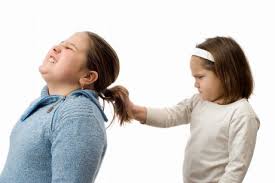The Difference Between Disruptive Behavior Disorders and ADHD
By Amanda Morin

At a Glance
- ADHD and disruptive behavior disorders are not the same thing.
- ADHD can affect behavior and other skills.
- Sometimes ADHD and disruptive behavior disorders coexist.
You may have heard people use phrases like “out of control” or “wild” to describe kids who have a hard time controlling their emotions and impulsive behavior. If they’re talking about your child, you might wonder if your child has a disruptive behavior disorder or . You might even think disruptive behavior disorders and ADHD are the same thing.
Disruptive behavior disorders and ADHD have some things in common, such as trouble keeping emotions in check and doing risky, impulsive things. But there are big differences between the two that can affect the strategies used to help your child.
What Are Disruptive Behavior Disorders?
All kids act up and act out from time to time. It’s normal to test limits to see when no really means no. Most kids have angry outbursts and sometimes use aggression to solve problems. These things are part of growing up and learning to be independent.
Most kids learn that refusing to listen to a parent, throwing tantrums and hitting people have consequences. But some kids act angry, defiant and aggressive in spite of the consequences. If this behavior is severe and continues for six months or more, it can be a sign of disruptive behavior disorder.
There are two main disruptive behavior disorders—conduct disorder (CD) and oppositional defiant disorder (ODD). They’re different from each other, although kids with CD may also have ODD.
What Is Conduct Disorder?
Conduct disorder is a serious condition that typically isn’t diagnosed until the teenage years. There’s no one known cause. It’s believed to be caused by a combination of genetic, psychological and environmental factors.
CD seems to be related to a child’s temperament. Temperament is the general mood and way of thinking we’re born with. Some people are easy-going and positive by nature. But kids with CD tend to be more difficult and negative. Kids with CD seem to enjoy causing harm and hurting other people. Other signs of CD include:
- Lying without feeling bad about it
- Threatening behavior toward others (fighting, bullying, emotional abuse)
- Stealing and destroying things
- Refusing to follow rules or laws
The biggest sign is that kids with CD have no respect or regard for other people’s rights or feelings. This is different from ODD and ADHD.
What Is Oppositional Defiant Disorder?
Symptoms of ODD typically show up before age 8. Although the symptoms usually appear in multiple settings (such as home and school) they may be more noticeable in one setting than others. Signs of ODD include:
- Being uncooperative on purpose
- Not following the rules
- Arguing, even about small and unimportant things
- An overall irritable and negative attitude
Most kids show those symptoms once in awhile. But with ODD they last for over six months and happen almost daily.
Is There a Connection Between ODD and ADHD?
Oppositional defiant disorder and ADHD have some similar symptoms. And some children may have both ADHD and ODD. Researchers aren’t sure what the connection is. But some think it may be tied into the fact that some kids with ADHD have a hard time controlling impulsive behavior and emotions. That can make it hard for kids to take turns and think before acting. It may also contribute to the reflexive “No!” that often is part of ODD.
How Are Disruptive Behavior Disorders and ADHD Different?
Not all kids who have ADHD have a disruptive behavior disorder. And not all kids with a disruptive behavior disorder have ADHD. Kids with ADHD can have problems following the rules and may be easily frustrated and angry, but those are just some of many symptoms.
The way the brain works in kids with ADHD makes it harder to for them to stay still and to control impulsive behavior. The brain matures more slowly in kids with ADHD than in kids without. Kids with ADHD may also have lower levels of the brain chemicals that help regulate mood and movement.
The result of these differences in brain development may look like disruptive behavior issues. But not all kids with ADHD have an ongoing pattern of negative behavior. Kids with ADHD may react to their environment and get upset. But kids with disruptive behavior disorder seem to be looking for arguments and ways to break rules and rebel.
Moving Forward
Knowing that disruptive behavior disorders and ADHD aren’t the same thing can be helpful to both you and your child. It’s something to talk about with your child as he moves toward self-advocacy so he can help inform people about his issues. It can help you advocate more effectively for your child’s needs. But most of all, it can help you make sense of your child’s symptoms as you plan your next steps.
Key Takeaways
- All kids are negative and stubborn at times. But that doesn’t mean they have a disruptive behavior disorder.
- Conduct disorder and oppositional defiant disorder are separate medical conditions, and they’re different from attention issues.
- Knowing the differences between ADHD and disruptive behavior disorders can help you and your child talk to other people about his issues.